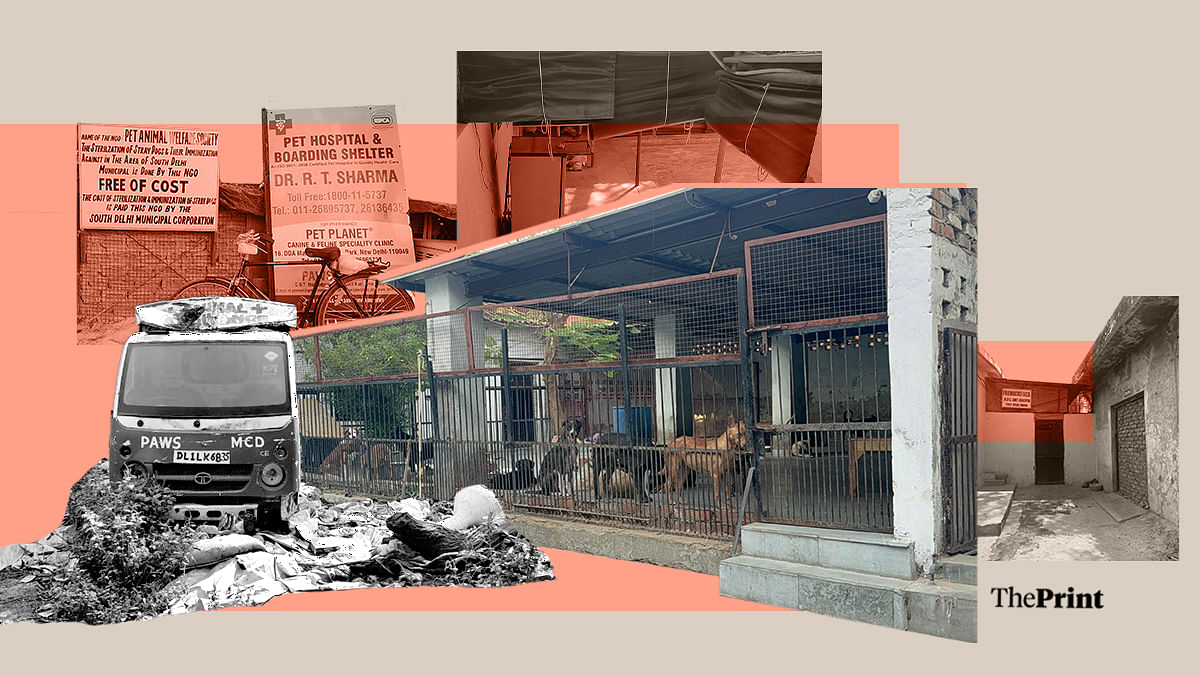Last month, Delhi Chief Minister Rekha Gupta called for the relocation of stray dogs in the city as part of a cleanliness drive. However, animal rights activists and the rescuer community say this amounts to cruelty and goes against established laws and rules. Sterilisation on a war footing, they say, is the most effective and humane way to bring down the city’s stray dog population but the city’s ABC centres are far from equipped to make it happen.
In Delhi, the ABC programme has been operational for the past two decades under the jurisdiction of the Municipal Corporation of Delhi (MCD), with 20 centres currently operational. However, a ground assessment by ThePrint of six such centres—Friendicoes-SECA, V.H. Ghazipur, Sonadi Charitable Trust in Najafgarh, Animal India Trust in Lajpat Nagar, PAWS in Masoodpur, and Dr. Sanjay Kumar’s and Dr. Rajeev Kumar’s centres in Usmanpur and Rohini, respectively—revealed alarmingly poor conditions and a blatant disregard for established rules and procedures.
ThePrint reached the administration of each of these six centres, but did not receive a response. This report will be updated if a response is received.
Also Read: As animal rescuers slam Delhi CM’s stray dog relocation directive, a look at issue from a legal lens
What the rules say
To run a sterilisation centre in India, one needs to follow a structured and legally mandated process under the Animal Birth Control Rules 2023—a set of guidelines for the management of the stray dog population through vaccination and sterilisation.
First and foremost is to obtain a project recognition from the Animal Welfare Board of India (AWBI). This recognition is not optional, it is essential under Rule 5. Whether it’s a local municipal authority or a registered animal welfare organisation, no one can carry out sterilisation or vaccination of stray dogs without this approval. A dedicated project recognition committee formed by the AWBI reviews each proposal before granting recognition.
Once it obtains the go-ahead, the organisation must develop proper infrastructure for the ABC centre. This includes surgical areas, post-operative recovery rooms, and kennels for dogs to rest before and after the procedure. A quarantine area is also necessary to isolate sick or aggressive dogs. Equally important is assembling a trained team: qualified veterinarians, para-veterinary staff, dog catchers, and support personnel. Everyone involved in the actual sterilisation and care must undergo training from institutions approved by the AWBI to ensure humane practices and medical competence.
ABC Centres do not work in isolation. They are meant to function in close coordination with local bodies like municipal corporations or gram panchayats. These local authorities are responsible for identifying areas with a high stray dog population, coordinating dog capture, and monitoring the effectiveness of the programme on the ground. Once the programme is underway, the process unfolds with the humane capture of stray dogs. They are brought safely to the centre, examined for fitness, and then sterilised under sterile surgical conditions. While under care, they also receive vaccinations, primarily against rabies.
After surgery, each dog is required to receive proper post-operative care, including food, antibiotics, and rest. Once the veterinarians certify that a dog has healed, it is released back to the exact location it was picked up. The rationale is that every dog has a defined territory, and disrupting this could lead to territorial fights and possibly human-animal conflict.
The work doesn’t end with surgery and release. Centres must keep detailed records—dog identification, medical history, surgery reports, release data, and even count the reproductive organs removed during the sterilisation surgeries that took place through the day. These reports must be submitted periodically to the AWBI and local bodies. At the same time, building community awareness around the ABC process is vital.
“When people understand the goals and the humane methods used, the programme faces less resistance and gains more volunteers and local support,” animal rights activist Vipul Jain, founder of PAWS (People for Animal Wellness and Sustainability) Foundation, told ThePrint. Established in 2023, PAWS Foundation has been spearheading animal welfare efforts inside the Jawaharlal Nehru University (JNU) campus.
The guiding principles behind the ABC Rules, 2023, are rooted in animal welfare and public health. No dog should be subjected to cruelty, pain, or unnecessary confinement. The larger aim is to manage the stray dog population humanely and scientifically, while also preventing diseases like rabies.
“If done right, these centres can play a transformative role—not just in controlling street dog numbers but in fostering a more compassionate relationship between animals and the people who live among them,” Jain added.
No vet, unsanitary conditions
However, the reality at at least six of these centres was very different. ThePrint found that at all six centres, not a single veterinarian or paravet was present between the hours of 11 am to 6 pm. The premises were unsanitary, infested with flies, and reeked of animal waste. This reporter was not allowed to take photographs of the enclosures where the dogs were kept.
For instance, at the Najafgarh centre run by Sonadi Charitable Trust—the largest ABC facility in Delhi—only one paravet was present, with no vet in sight, despite more than 6–7 unattended dogs in the reception area. One caretaker, who declined to be named, claimed they received around 11–12 dogs daily. There were three caretakers at the centre in total, including one paravet.
Several dogs were crammed together in a tin shed enclosure outside the clinic, exposed to the scorching heat. These dogs had no identification tags mandated under sub-sections 3 and 8 of ABC Rules Section 11. It clearly states that all stray dogs caught for sterilisation are to be identified with a numbered collar immediately upon arrival at a centre.
When asked about the dogs, a caretaker casually said, “These are the dogs who never went back.” He also said that the team does not actively catch stray dogs but responds only to complaints.
The centre had two vans and one of the workers was seen checking a wire noose, which he claimed was “effective” in catching the dogs. However, such tools often lead to injuries and strangulation. Notably, a 2011 meeting of the MCD’s ABC monitoring committee had recommended humane alternatives like butterfly nets. This remains unimplemented.
Dogs were exposed to the natural elements at the PAWS centre near Vasant Kunj since a middle section of the tin-roof shed was open. According to the caretaker, only four of the dogs currently housed there came through the MCD. The rest—around 10 to 15 dogs—were brought in through their NGO. In such cases, residents pay Rs 2,500 to have stray dogs from their neighbourhood sterilised.
In contrast, the pet boarding section had cooling sheets, proper sanitation, and designated spaces for washing and bathing pets.
The Rohini ABC centre operates out of a three-storey building, though only the ground floor is in use. When ThePrint visited the centre, it was locked from the inside. The staff only opened the doors to the premises after persistent knocking.
It did not look like the facility was being used for either sterilisation or vaccination. Of the five rooms on the ground floor, two looked like they were being used as living quarters for the staff. One of the rooms was empty with a few clean medical supplies and what looked like unused doctor’s uniforms, and two had surgery tables, but no signs of regular surgical activity despite the caretakers’ claim that at least one sterilisation surgery takes place every day. The centre had three vans, and their rusty appearance appeared to be an indication that they were not being used.
At first, the four staff members claimed that one of them was a dog catcher and two were paravets. However, none of them could answer questions about surgeries or the ABC programme. Eventually, they said they were just caretakers.

Behind the main building, stray dogs were being kept in another comparatively smaller building. Inside, flies swarmed the enclosures, while blood and urine could be seen on the floors and their stench permeated the air. More than three dogs were crammed into enclosures, without any markings or records of their pickup locations. However, the facility was barely half full.
In October 2023, the Rohini centre was among those that were temporarily restrained by the MCD from performing sterilisation work on the directions of the Delhi High Court. The court reiterated that no society, trust, or cooperative society could carry out the ABC programme without project recognition certificates.
It was not clear if the centre has still obtained a certificate.
2023 report flags disregard for the welfare of animals
According to a report submitted to the Delhi High Court in Anubhav Khajuria and others vs Union of India through Ministry of Fisheries, Animal Husbandry and Dairying (2023) by animal welfare activist Gauri Maulekhi and advocate Shalini Aggarwal, between January to April 2023, 4 out of 20 centres in Delhi were non-functional. Of the operational ones, four were not run by animal welfare organisations but by private veterinarians with “motive of profit”, the report said.
“The disregard for the welfare of animals and failure to adhere to minimum standards under the 2023 Rules (previously 2001 Rules) and Revised Module to cut corners and find higher profit margins is evident,” said the ‘Report on the Implementation of Animal Birth Control Program in Delhi.’
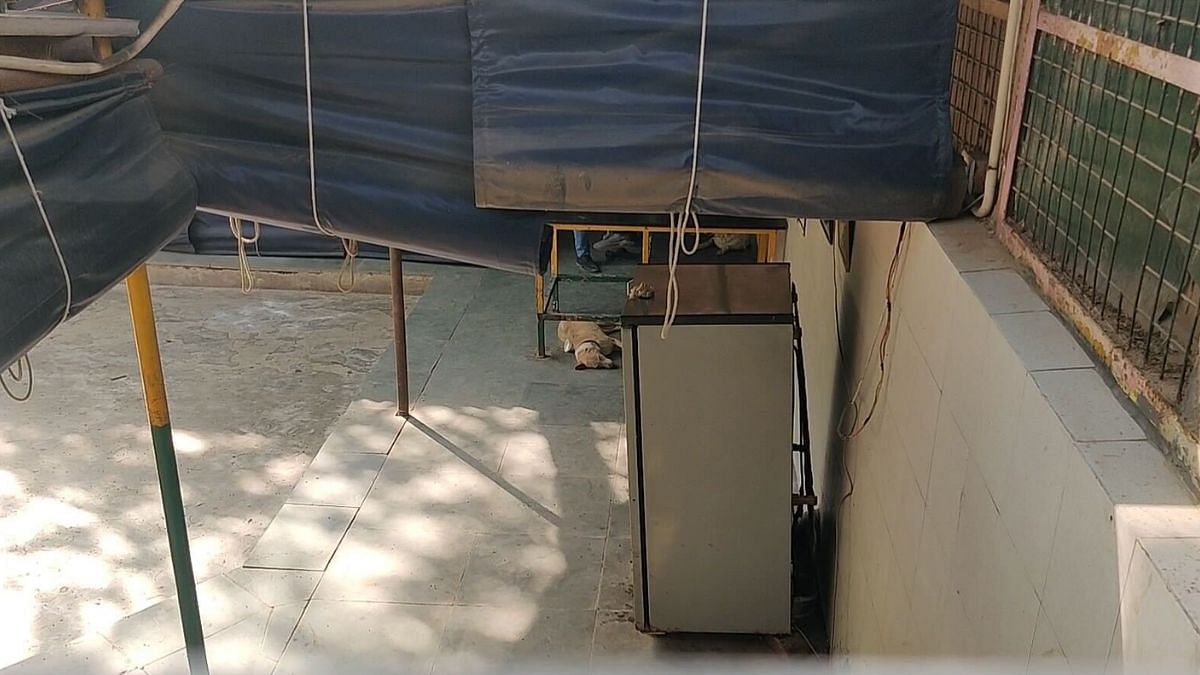
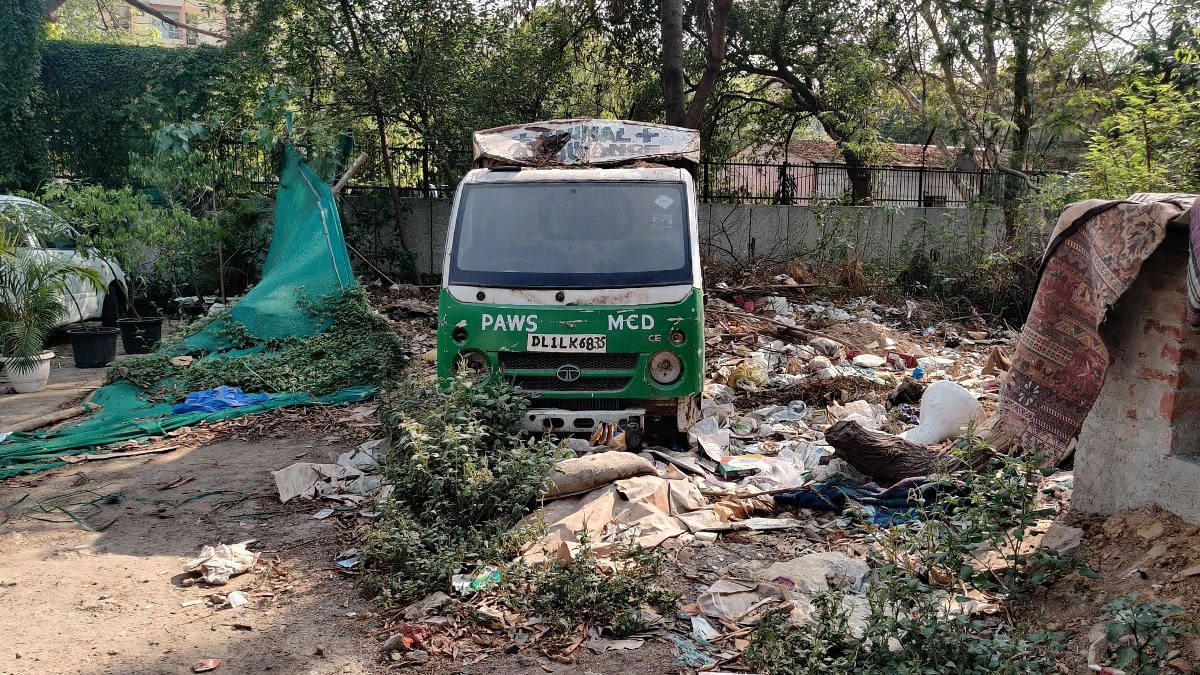
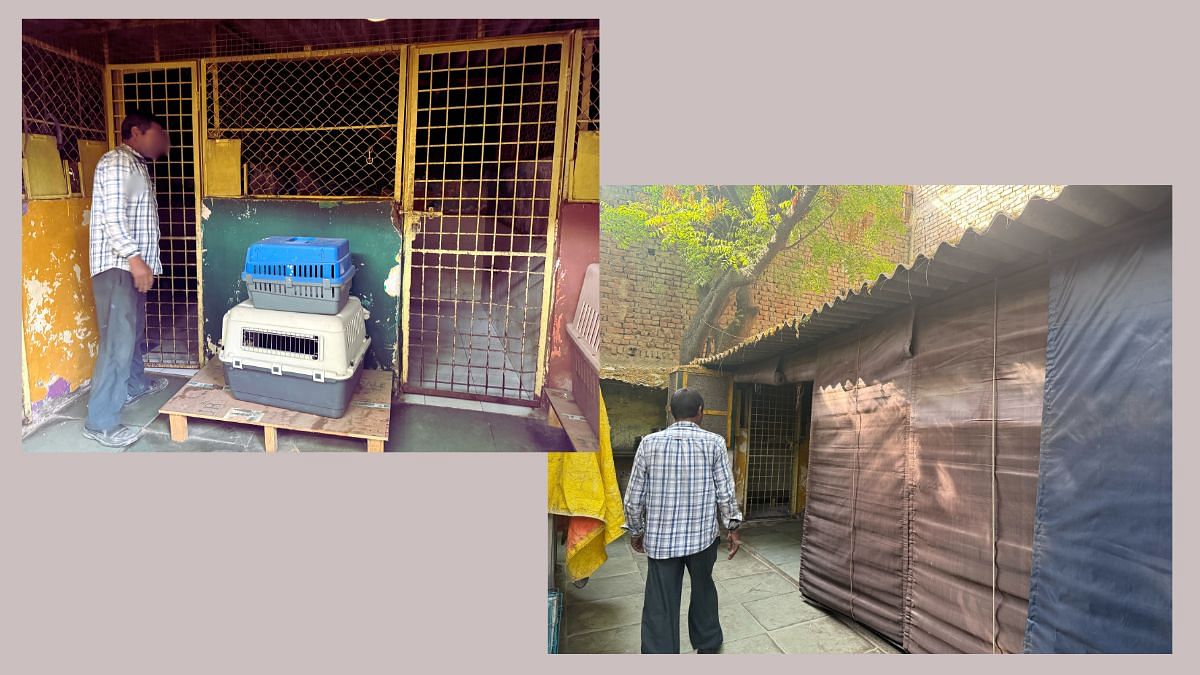
The Rohini centre, according to the report, claimed to have sterilised over 3,700 dogs between April 2022 and January 2023. However, records showed that it procured only 1,000 doses of vaccines in 2022, and none thereafter until January 2023. This suggests that less than a third of the dogs listed in the organ counting certificates were actually vaccinated by the centre. This would be a clear violation of ABC Rules, which mandate the release of sterilised dogs within three days post-surgery, or five days in the case of complications.
In several instances, when stray dogs were picked up by MCD teams, the ABC centre was not provided with accurate pickup locations, making a timely and lawful release of the dogs difficult.
The report also flagged improper waste disposal across most centres. It found that solid and biomedical waste were often stored in uncovered bins within the premises. There was also no visible implementation of segregation, storage, or disposal under the Solid Waste Management Rules, 2016, and the Bio-Medical Waste Management Rules, 2016.
It further said that none of the ABC centres maintained logbooks for their dog-catching vans. This lack of documentation made it impossible to track the distance covered or areas visited by the vans daily.
At the Friendicoes facility in Ghazipur that ThePrint visited, the conditions were unsanitary for both the animals and the workers. Again, the room where the dogs were being kept reeked of urine and body waste, making it almost impossible to stay inside for more than a few seconds. Puddles of urine pooled across the floor, leaking into the adjacent room where discarded bandages, plastic wrappers, and old newspapers crusted with dirt, among other trash, covered the floor. Flies had settled on every surface. Caretakers claimed the centre housed over 100 dogs, despite lacking the infrastructure to accommodate that number.
In June 2022, the facility reported the sterilisation of 721 dogs. However, according to the report submitted to the Delhi HC, sterilising that many dogs in a month would require space for at least 150 dogs at any given time, while the facility only had space for 84 dogs at one time.
Activists say process is a sham
Dr Suresh Kumar Yadav, the deputy director (veterinary services) at the MCD, did not respond to ThePrint’s request for comment, while Navin Choudhary, additional chief secretary in the Department of Urban Development and Director of Local Bodies (DLB), said that at a state ABC monitoring committee meeting in March, “there were a lot of defaulters who did not have project recognition. They were given a warning. Very few had the certificate.”
But he declined to give details.
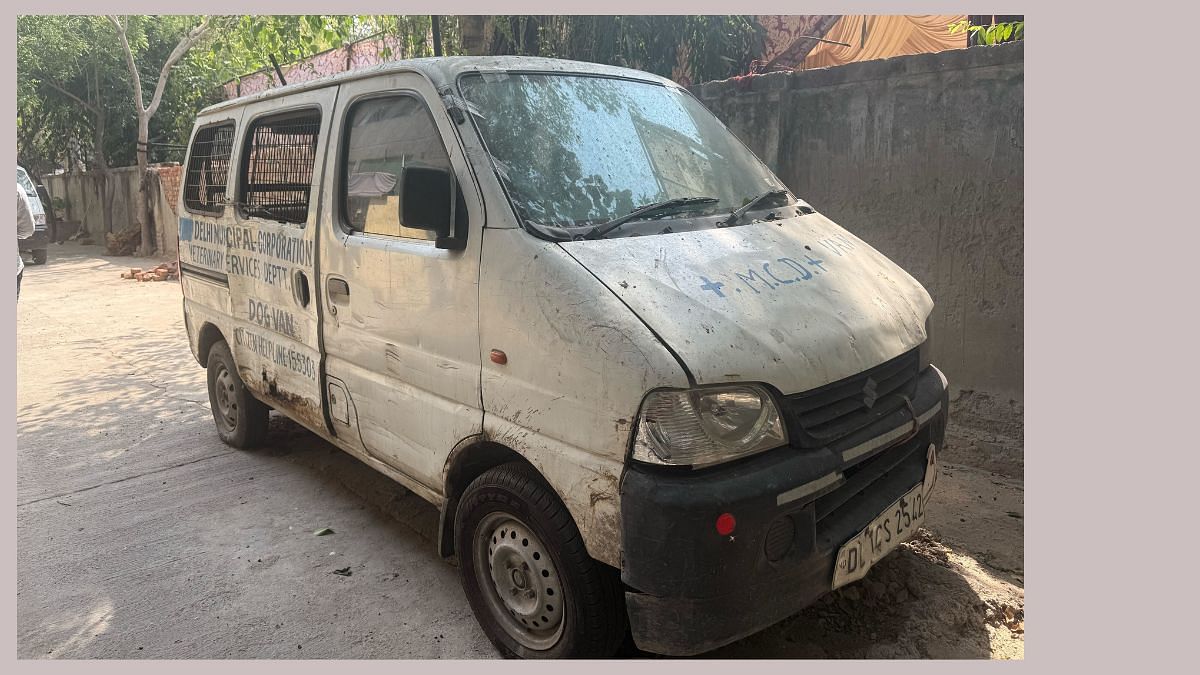
According to a dog census conducted by the MCD in 2012, there were an estimated 2 lakh stray dogs in the national capital. No fresh census has been carried out since.
Animal rights activists estimate that the current stray dog population in Delhi is significantly higher—closer to 7.5 lakh, highlighting the urgent need for updated figures and better implementation of population management programmes.
Meanwhile, according to the report submitted to the Delhi HC, the MCD claimed to have sterilised over 5 lakh dogs between 2016 and December 2022.
“While the ABC programme remains the only legally sanctioned method for managing dog populations, its implementation in Delhi has been a complete sham for years,” Maulekhi, who is also the trustee of People for Animals, India’s largest animal welfare organisation, told ThePrint.
She pointed out that the infrastructure in most ABC centres does not meet the required standards. “There are hardly any records being maintained as per the rules”, and inspection teams responsible for organ counting, mandated under the ABC rules, are also not functioning as they should.
Maulekhi added that surveillance systems, such as CCTV cameras, are supposed to be installed not only in operating theatres but also in kennel areas, yet they are missing in most places. “There is no training for veterinarians, paravets, or dog catchers,” she said, describing the programme as unorganised and poorly managed.
She explained that if the ABC programme were implemented properly, Delhi’s stray dog population would not be as high as it is today. According to her, many centres are not conducting sterilisation surgeries at all. “Most of them are just billing for surgeries. They are not actually doing them,” she said.
She also raised concerns about the role of officials in the MCD. “Some MCD officials are extremely corrupt. We’ve raised complaints, but nothing has come of them,” she said.
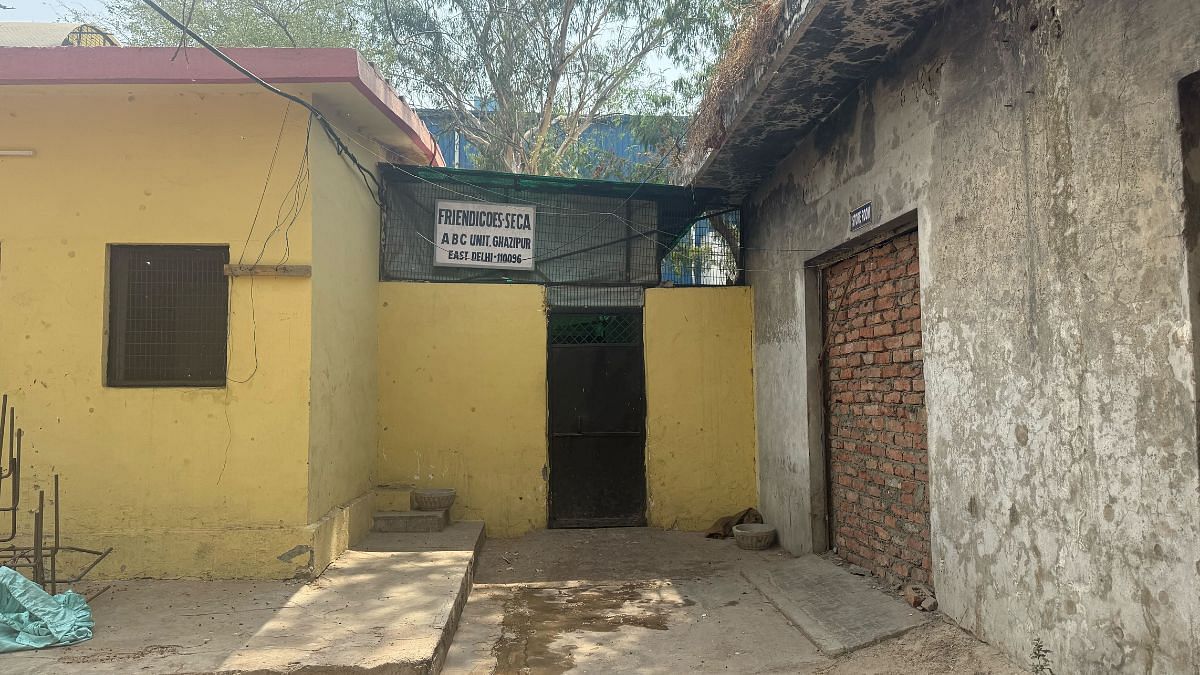
In her view, the process involves private contractors getting tenders, raising false bills for surgeries that never happened, and receiving payments from MCD officials in return for kickbacks. “That is the state of the ABC programme in Delhi.”
Former MP Vijay Goel argued that the current rules are impractical and force Resident Welfare Associations (RWAs) and NGOs to bear responsibilities they didn’t sign up for. Goel is leading a public campaign against the ‘stray dog problem’. According to the website, the movement is trying to raise awareness against stray dog bites and to ensure an “amicable human-dog relationship”.
“Dogs should not be allowed to live in residential societies where people are unwilling to let them in,” Goel said, asking why residents should accept their presence if they feel unsafe. He claimed that most ABC centres—run by these NGOs—are ineffective. “NGOs are doing nothing. Why is MCD outsourcing to them?”
Goel also criticised the AWBI, alleging that a handful of members control the registration process and limit the number of NGOs allowed to operate in Delhi. “It’s wrong to centralise everything. Local bodies should be allowed to do their work without interference from AWBI.”
According to MCD, between January 2018 and February 2023, 1,27,036 dog bite cases were recorded. However, it was not clear how many of these cases were stray dogs.
Learning from successes in UP, Uttarakhand
According to Maulekhi, Uttarakhand and Lucknow could serve as model examples for other states in implementing the ABC programme. She said the initiative in Uttarakhand, which was virtually non-existent before 2014, began with careful planning. The government realised it couldn’t roll out the programme across the entire state at once, so it adopted a phased approach.
They first targeted three major tourist destinations—Nainital, Mussoorie, and Dehradun. From there, the programme expanded to nearby local authorities and eventually to larger municipal areas in the plains. Maulekhi explained that the creation of well-equipped ABC centres, particularly, is what made this approach effective.
These centres were not just makeshift sheds seen in Delhi, but scientifically designed hospitals with proper operation theatres, post-operative care units, quarantine and isolation facilities, residential quarters for staff, kitchens for feeding dogs, and dedicated areas for medicine storage and record-keeping.
She pointed out that the Dehradun centre, being the first of its kind, became a model facility that was later replicated by other states. “People from different states came and copied that programme,” she said.
Lucknow, she added, is another success story. It now has India’s largest ABC centre, which is also on its way to becoming a national training hub for the programme.
Maulekhi emphasised that such success was only possible because the state government took ownership and monitored the programme closely. In Uttarakhand, a state-level ABC monitoring committee meets every three months, chaired by the state’s urban development secretary, to review progress.
Monthly progress reports are submitted from each ABC centre—not only to the government but to all committee members, including Maulekhi herself.
She remarked that this process helps catch issues early before they fester or corruption sets in. “That’s what’s gone wrong in Delhi,” she said, pointing to how the absence of strong oversight has led to serious lapses in the capital’s ABC programme.
(Edited by Sanya Mathur)
Also Read: Kedarnath pilgrimage is injuring mules—8,000 overworked animals, 1 medical shelter
